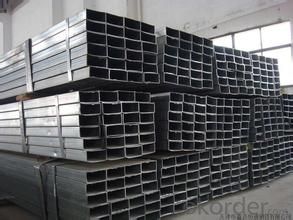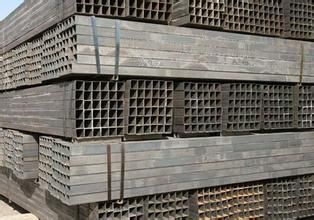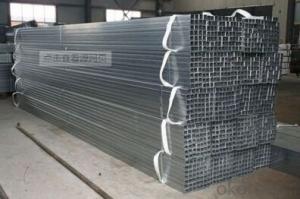Rectangular Hot Rolled Carbon Steel Tube
- Loading Port:
- China main port
- Payment Terms:
- TT or LC
- Min Order Qty:
- 100 m.t.
- Supply Capability:
- 10000 m.t./month
OKorder Service Pledge
OKorder Financial Service
You Might Also Like
1.Quick Details
Thickness: | 1.0 - 35 mm | Section Shape: | Square | Outer Diameter: | 20*20-600*600 |
Place of Origin: | Shandong China (Mainland) | Secondary Or Not: | Non-secondary | Application: | Structure Pipe |
Technique: | Cold Rolled | Certification: | CE | Surface Treatment: | oil,paint |
Special Pipe: | Thick Wall Pipe | Alloy Or Not: | Non-alloy | Name: | Square Hollow Steel Pipe/Tube |
Shape: | Square/Rectangular | Yield Strength: | 360-380Mpa | Tensile Strength: | 560-580Mpa |
Elongation: | 24-28% | Bend Test: | Qualified | Impact Value: | V-notch |
Grade: | 20#,45#,16Mn,A210,St45,Q235,Q345,Q195,Q215,10#-45#,A53-A369,ST35-ST52,Q195-Q345 | Standard: | JIS G3465-2006,JIS G3466,GB/T 3094 |
2.FAQ of Rectangular Steel Tube
①How is the quality of your products?
Our products are manufactured strictly according to national and internaional standard, and we take a test
on every pipe before delivered out. If you want see our quality certifications and all kinds of testing report, please just ask us for it.
Guaranteed: If products’ quality don’t accord to discription as we give or the promise before you place order, we promise 100% refund.
②How about price?
Yes, we are factory and be able to give you lowest price below market one, and we have a policy that “ for saving time and absolutely honest business attitude, we quote as lowest as possible for any customer, and discount can be given according to quantity”,if you like bargain and factory price is not low enough as you think, just don’t waste your time.Please trust the quotation we would give you, it is professional one.
③Why should you chose us?
Chose happens because of quality, then price, We can give you both.Additionally, we can also offer professional products inquiry, products knowledge train(for agents), smooth goods delivery, exellent customer solution proposals.Our service formula: good quality+good price+good service=customer’s trust
SGS test is available, customer inspection before shipping is welcome, third party inspection is no problem.
If you have any question, pls feel free to contact us !
3.Rectangular Hot Rolled Steel Tube Image


- Q:How are steel pipes protected against UV radiation?
- Steel pipes are typically protected against UV radiation through the application of coatings or paints that contain UV inhibitors. These coatings act as a barrier between the steel surface and the harmful UV rays, preventing damage and degradation of the pipes over time. Additionally, some steel pipes may be treated with zinc or other metals, which offer inherent UV protection and enhance the overall durability of the pipes.
- Q:Are steel pipes suitable for underground irrigation systems?
- Underground irrigation systems can indeed benefit from the use of steel pipes. Renowned for their durability and strength, steel pipes exhibit resistance to corrosion and can withstand significant pressure. Furthermore, they are less prone to cracking or breaking when subjected to the weight and pressure of the ground. Moreover, steel pipes boast an extended lifespan, alleviating the need for frequent replacements. Nevertheless, it is crucial to consider the composition of the water being conveyed, as certain minerals or chemicals may induce corrosion over time. In such instances, it might be necessary to employ corrosion-resistant coatings or liners. All in all, steel pipes represent a dependable choice for underground irrigation systems, particularly in regions characterized by elevated water pressure or when durability takes precedence.
- Q:What are the different methods of insulation for steel pipes?
- There are several methods of insulation for steel pipes, including thermal insulation, such as fiberglass or mineral wool wraps, foam insulation, such as polyurethane or polyethylene foam, and reflective insulation, like foil-faced insulation. Each method has its own advantages and is chosen based on factors such as the intended use, temperature range, and desired level of insulation.
- Q:What are the different standards for steel pipes?
- There are several different standards for steel pipes, including ASTM (American Society for Testing and Materials), API (American Petroleum Institute), and ASME (American Society of Mechanical Engineers). These standards specify the requirements for various aspects of steel pipes, such as their dimensions, chemical composition, mechanical properties, and testing procedures. These standards ensure that steel pipes meet the necessary quality and safety standards for their intended applications.
- Q:What is the role of steel pipes in the mining and extraction of minerals?
- Steel pipes play a critical role in the mining and extraction of minerals as they are used for various applications throughout the process. These durable pipes are commonly employed to transport and distribute water, chemicals, and compressed air to different areas of the mine. Additionally, steel pipes are utilized in the construction of mine shafts, tunnels, and underground structures, providing stability and support. Their ability to withstand harsh conditions, resistance to corrosion, and high strength make steel pipes an indispensable component in the mining industry.
- Q:Can steel pipes be used for conveying oil?
- Steel pipes are suitable for the transportation of oil. In the oil and gas industry, steel pipes are widely utilized for the conveyance of oil due to their robustness, longevity, and resistance to corrosion. The exceptional strength of steel pipes enables them to endure the demanding conditions of high pressure and temperature that often accompany oil transportation. Furthermore, steel pipes are less susceptible to leakage and damage in comparison to alternative materials, thus making them a dependable choice for the efficient transfer of oil over extensive distances. Moreover, the sleek interior surface of steel pipes aids in reducing friction and improving the oil flow. Overall, steel pipes are the preferred option for oil transportation owing to their superior mechanical properties and enduring performance.
- Q:Can steel pipes be used for wastewater systems?
- Certainly, wastewater systems can indeed utilize steel pipes. Due to their impressive durability, strength, and resistance to corrosion, steel pipes have gained widespread popularity in wastewater systems. They possess the capacity to endure high pressure and effectively convey wastewater over extensive distances. Furthermore, steel pipes offer the advantage of ease in welding, allowing for the creation of a seamless pipeline system that minimizes the risk of leakage. Additionally, steel pipes demonstrate environmental friendliness as they can be recycled, rendering them a sustainable choice for wastewater systems. Nevertheless, it remains crucial to take into account the specific requirements of the wastewater system and seek guidance from experts to determine the most suitable material for the project.
- Q:How are steel pipes used in the manufacturing of chemical processing equipment?
- Steel pipes are commonly used in the manufacturing of chemical processing equipment due to their durability, corrosion resistance, and ability to withstand high temperatures and pressures. These pipes are used to transport fluids, such as chemicals, gases, and liquids, throughout the various stages of the manufacturing process. In chemical processing equipment, steel pipes are primarily used for two main purposes: as conduits for the transportation of raw materials and as channels for the distribution of processed products. Firstly, steel pipes are used to transport raw materials, such as chemicals and solvents, from storage tanks or external sources to the various processing units within the equipment. These pipes ensure the safe and efficient movement of these materials, allowing for accurate and controlled dosage and distribution. Steel pipes are preferred due to their strength, which enables them to handle the high pressures and temperatures involved in chemical processing. Secondly, steel pipes are used to distribute the processed products throughout the equipment. Once the raw materials have undergone various chemical reactions and transformations, the resulting products need to be transported to the next stage or collected for further processing. Steel pipes are ideal for this purpose as they can withstand the corrosive nature of many chemicals and can handle the high temperatures encountered during these processes. Furthermore, steel pipes are also used in chemical processing equipment for their versatility and compatibility with various chemicals and solvents. They can be easily customized to accommodate specific requirements, such as different pipe sizes, shapes, and fittings. This flexibility allows for efficient design and installation, ensuring a seamless flow of materials and products throughout the equipment. Overall, steel pipes play a crucial role in the manufacturing of chemical processing equipment by providing a reliable and efficient means of transporting raw materials and distributing processed products. Their durability, corrosion resistance, and ability to withstand high temperatures and pressures make them an essential component in ensuring the safe and efficient operation of chemical processing equipment.
- Q:How are steel pipes classified according to their wall thickness?
- Steel pipes are classified according to their wall thickness into three categories: standard weight, extra-strong, and double extra-strong.
- Q:How are steel pipes used in the aerospace manufacturing industry?
- Steel pipes are used in the aerospace manufacturing industry for a variety of applications, including fuel and hydraulic systems, structural components, and engine parts. They provide durability, strength, and corrosion resistance, ensuring the safety and reliability of aircraft.
1. Manufacturer Overview |
|
|---|---|
| Location | |
| Year Established | |
| Annual Output Value | |
| Main Markets | |
| Company Certifications | |
2. Manufacturer Certificates |
|
|---|---|
| a) Certification Name | |
| Range | |
| Reference | |
| Validity Period | |
3. Manufacturer Capability |
|
|---|---|
| a)Trade Capacity | |
| Nearest Port | |
| Export Percentage | |
| No.of Employees in Trade Department | |
| Language Spoken: | |
| b)Factory Information | |
| Factory Size: | |
| No. of Production Lines | |
| Contract Manufacturing | |
| Product Price Range | |
Send your message to us
Rectangular Hot Rolled Carbon Steel Tube
- Loading Port:
- China main port
- Payment Terms:
- TT or LC
- Min Order Qty:
- 100 m.t.
- Supply Capability:
- 10000 m.t./month
OKorder Service Pledge
OKorder Financial Service
Similar products
New products
Hot products
Related keywords































